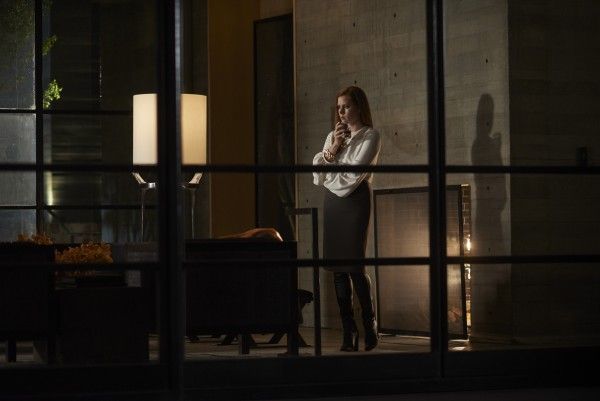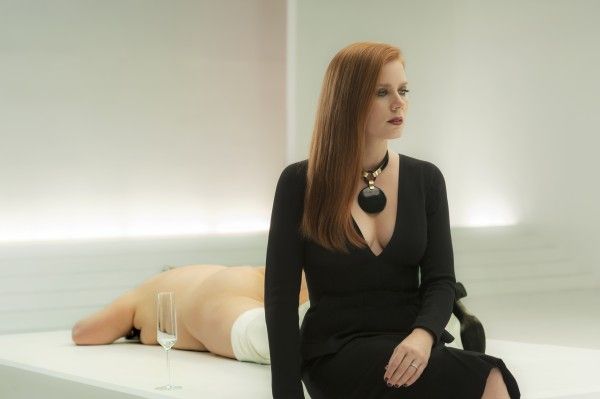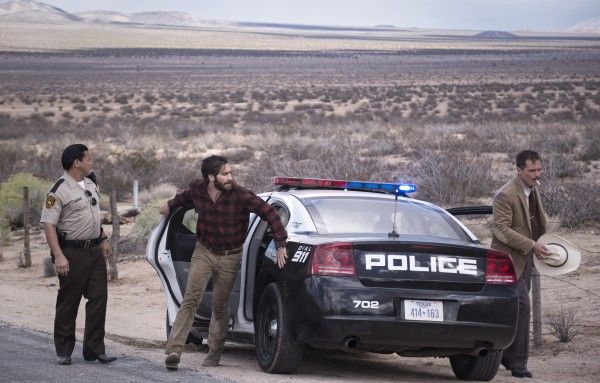[This is a re-post of my review from the 2016 Toronto International Film Festival. Nocturnal Animals opens in limited release on Friday.]
Tom Ford’s Nocturnal Animals largely revolves around two truisms: people (specifically, women) eventually turn into their mothers, and that writers should write what they know. Ford has taken these two ideas and turned them into two, intertwining stories that come to the same thematic point: we can’t escape the narratives that come to define us. A woman who tries to pull away from her mother’s footsteps will eventually be sucked into the same despair. A man who was hurt by his ex-wife can only see himself within the framework of the emotional devastation. Featuring incredible performances from its entire case, Nocturnal Animals is a haunting examination of two people trapped by their past, present, and future.
Susan Morrow (Amy Adams) is a depressed art dealer who has grown distant from her husband Hutton (Armie Hammer). One day, Susan receives a package from her ex-husband, Edward Sheffield (Jake Gyllenhaal). The package contains a novel entitled “Nocturnal Animals”, and it’s dedicated to her. While Hutton is away on business, Susan begins reading the book, which is about family man Tony Hastings (also Gyllenhaal) who, while on a road trip with his wife Laura (Isla Fisher) and daughter India (Ellie Bamber), gets attacked by three violent rednecks led by Ray Marcus (Aaron Taylor-Johnson). After Tony’s wife and daughter are kidnapped by the rednecks, he enlists the help of officer Bobby Andes (Michael Shannon) to help find his lost family. Meanwhile, back in the real world, Susan begins to flashback to her life with Edward and thinking about how their marriage fell apart.
The film starts at an interesting place after some shocking opening credits that feature naked obese women happily dancing as part of Susan’s new art exhibit. It’s not so much that the dancing women have meaning as much as Susan, like an addict who has been rendered numb over time, is trying to shock her system awake. We eventually learn she’s an artist who never pursued her creativity so she decided to run an art gallery instead. She’s a woman who’s trying to find meaning in art, and yet she’s spent almost twenty years running from the shape of her own story, which she finally has to confront in the form of Edward’s book.
Through the Edward/Tony narrative, we see the pain that has consumed him in the intervening years. Rather than tell an autobiographical tale, Edward has transferred his raw emotions into a dark, twisted revenge narrative. He’s not only baring his soul to Susan; he’s showing her the soul she left him with after she ripped apart their marriage. By looking at Edward’s story figuratively rather than literally, Susan begins to feel the emotional cost of her actions, and, even more tragically, that she was perhaps fated to make those choices because of her similarities to her selfish mother (Laura Linney).
Normally, when a fiction is nestled inside a movie, that fiction carries less weight. It’s not “real”, so it doesn’t matter as much. Ford subverts this expectation by making Edward’s “fiction” as real as Susan’s life. We’re looking at two damaged people through two lenses, but they’re occupying the same emotional space even if they haven’t inhabited the same physical space in 19 years. There’s a great swell of pity from Ford for his characters, but also a sense of disgust at how they’ve treated each other. Susan and Edward are both tragic figures, and yet they’re also partially responsible for the narratives they’ve constructed.
Ford’s direction is, like his previous feature A Single Man, immaculate. Seamus McGarvey’s cinematography is striking, and composer Abel Korzeniowski once again provides his director with a brooding, sorrowful score. As one would expect from a fashion designer, Ford outfits his characters beautifully, but the fashion always helps illustrate the characters. The stark, clean lines of Susan’s expensive wardrobe betray a woman whose current life is tidy because it’s hollow, and Tony’s clothing eventually becomes simple and direct as his worldview narrows to getting revenge against Ray.
But where Nocturnal Animals shines brightest is with its performances. Between Arrival and Nocturnal Animals, Amy Adams should get nominated for Best Actress for both films and win both Oscars in a tie. The film basically asks her to play two roles: the optimistic grad student who believes she can break away from her family and live happily ever after with aspiring novelist Edward; and the struggling gallery owner in a loveless marriage who regrets what her life has become. Adams is one of the finest actors working today, and her work here is among her finest.
Shannon is the other standout in a cast where there isn’t a weak link. He plays Bobby with a fascinating mix of tired resignation, grim determination, and almost comical indifference. Ford and Shannon never let Bobby simply sit as a good guy who’s aiding Tony. He’s the weary traveler who has seen all of life’s injustices and on the one hand he’s willing to accept it, and on the other hand he wants to rage against what’s been done to Tony. You never quite know what to expect from Bobby in a given scene, and yet the performance always rings with pathos, humanity, and even humor.
Nocturnal Animals didn’t hit me with the same emotional gut-punch as A Single Man, and yet it feels like a richer, more complex, and ambitious film that I think will stay with me long after this morning’s screening. Ford has taken the fatalism of the revenge genre and spun it into a reflection of regret and bitterness. It’s a movie that gets under your skin, into your bones, and leaves you feeling as trapped as its two doomed protagonists.
Rating: A-





